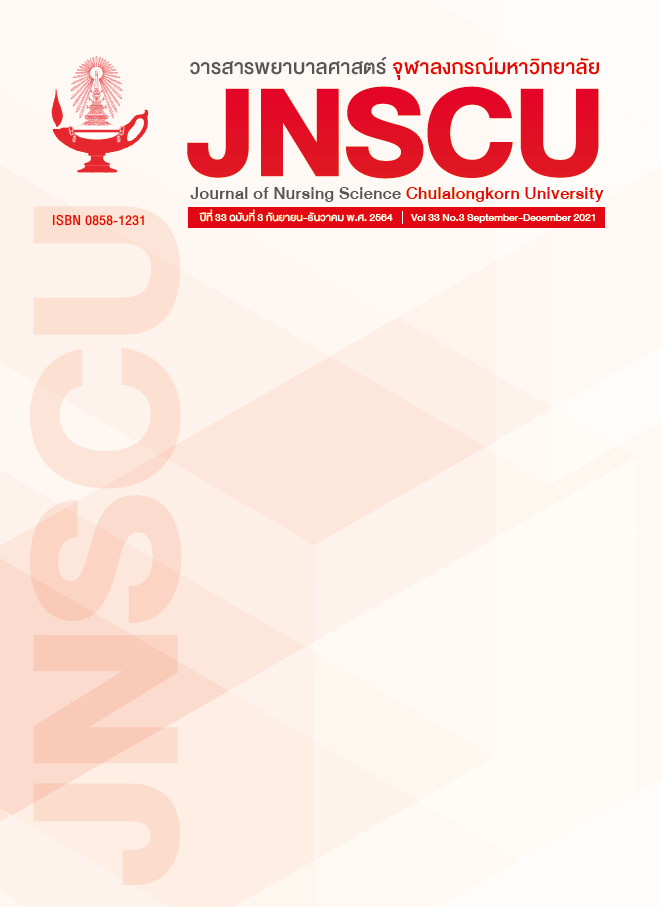ผลของการประยุกต์รูปแบบเชิงระบบของนิวแมนต่อการควบคุม การติดเชื้อของมารดาเด็กโรคมะเร็งเม็ดเลือดขาว
คำสำคัญ:
รูปแบบเชิงระบบของนิวแมน, การควบคุมการติดเชื้อ, เด็กโรคมะเร็งเม็ดเลือดขาว, การติดเชื้อบทคัดย่อ
วัตถุประสงค์: เพื่อเปรียบเทียบการควบคุมการติดเชื้อของมารดาผู้ป่วยเด็กโรคมะเร็งเม็ดเลือดขาวที่ได้รับยาเคมีบำบัด ระหว่างกลุ่มที่ได้รับการพยาบาลที่ประยุกต์รูปแบบเชิงระบบของนิวแมนกับกลุ่มที่ได้รับการพยาบาลตามปรกติ
รูปแบบการวิจัย: การวิจัยกึ่งทดลอง
วิธีดำเนินการวิจัย: มารดาของผู้ป่วยเด็กโรคมะเร็งเม็ดเลือดขาวที่ได้รับการรักษาด้วยยาเคมีบำบัด ในโรงพยาบาลรามาธิบดี จำนวน 30 คน คือ กลุ่มตัวอย่างที่ได้รับการคัดเลือกอย่างเฉพาะเจาะจง แบ่งกลุ่มเป็นกลุ่มควบคุมและกลุ่มทดลอง กลุ่มละ 15 คน โดยกลุ่มทดลองได้รับการพยาบาลที่ประยุกต์รูปแบบเชิงระบบของนิวแมน เก็บรวบรวมข้อมูลโดยใช้แบบสอบถามพฤติกรรมป้องกันการติดเชื้อของมารดาเด็กโรคมะเร็งเม็ดเลือดขาวที่ได้รับยาเคมีบำบัด วิเคราะห์ข้อมูลด้วยสถิติพรรณนา และสถิติ Mann-Whitney U
ผลการวิจัย: มารดาของผู้ป่วยเด็กโรคมะเร็งเม็ดเลือดขาวที่ได้รับการรักษาด้วยยาเคมีบำบัด กลุ่มที่ได้รับการพยาบาลที่ประยุกต์รูปแบบเชิงระบบของนิวแมนมีการควบคุมการติดเชื้อ ซึ่งเป็นส่วนหนึ่งของพฤติกรรมป้องกันการติดเชื้อดีกว่ากลุ่มที่ได้รับการพยาบาลตามปรกติ อย่างมีนัยสำคัญทางสถิติที่ระดับ .05
สรุป: ผลการศึกษานี้แสดงให้เห็นว่า การพยาบาลประยุกต์รูปแบบเชิงระบบของนิวแมนสามารถทำให้มารดาดูแลป้องกันการติดเชื้อให้กับเด็กโรคมะเร็งเม็ดเลือดขาวได้
เอกสารอ้างอิง
Wiangnon S, Veerakul G, Nuchprayoon I,
Seksarn P, Hongeng S, Krutvecho T,
et al. Childhood cancer incidence and
survival 2003-2005, Thailand: study
from the Thai Pediatric Oncology Group.
Asian Pac J Cancer Prev 2011; 12(9):
-20.
Veerakul K, Sanpakit K. Child Cancer. Bangkok:
Chaunpim; 2002.
Wanitpongpun C, Amampai W, Teawtrakul N,
Chansung K, Sirijeerachai C. Clinical
characteristics, causative organisms, role
of serum galactomannan and treatment
outcomes of acute leukemia patients
with febrile neutropenia. Srinagarind
Med J 2017; 32(6): 511-8. (in Thai)
Lekdamrongkul P, Pongthavornkamol K,
Chewapoonpon C, Siritanaratkul N.
Factors associated with febrile
neutropenia in acute leukemic patients
receiving chemotherapy. J Nurs Sci
; 27(2): 58-68. (in Thai)
Perkins JL, Harris A, Pozos TC. Immune
dysfunction after completion of
childhood leukemia therapy. Pediatr
Hematol Oncol J 2017; 39(1): 1-5.
Chong CY, Tan AM, Lou J. Infections in acute
lymphoblastic leukaemia. Ann Acad
Med Singapore 1998; 27: 491-5.
Pizzo PA. Management of fever in patients
with cancer and treatment-induced
neutropenia. N Engl J Med 1993;
(18): 1323-32.
Neuman BM, Fawcett J. The neuman systems
model. 4th ed. Upper Saddle River, NJ:
Prentice Hall; 2002.
Maxwell C, Stein A. Implementing evidencebased
guidelines for preventing
chemotherapy-induced neutropenia:
From paper to clinical practice.
Community Oncol 2006; 8(3): 530-6.
Doi: 10.1016/S1548-5315(11)70747-1.
Worapanwisit T, Paritsiraprapa C, Rotchanarak
W. Prevention of febrile neutropenia in
acute leukemia patients: Role of nurse.
JRTAN 2020; 21(3): 11-9.
ดาวน์โหลด
เผยแพร่แล้ว
ฉบับ
ประเภทบทความ
สัญญาอนุญาต

อนุญาตภายใต้เงื่อนไข Creative Commons Attribution-NonCommercial-NoDerivatives 4.0 International License.
##default.contextSettings.thaijo.licenseTerms##


